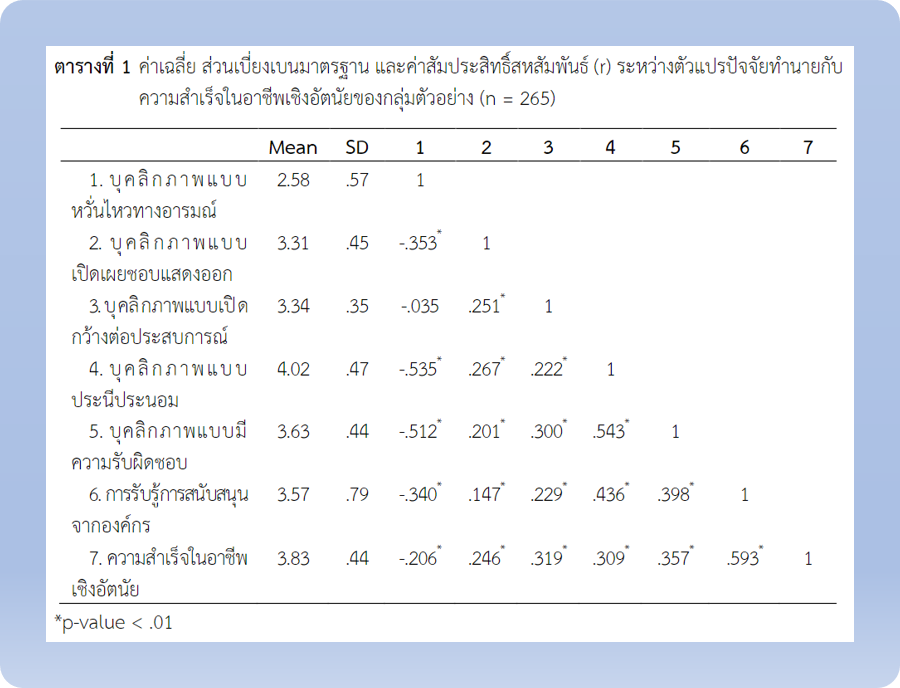ปัจจัยทำนายความสำเร็จในอาชีพเชิงอัตนัยของพยาบาลในโรงพยาบาลสังกัดสำนักการแพทย์ กรุงเทพมหานคร
คำสำคัญ:
บุคลิกภาพห้าองค์ประกอบ, การรับรู้การสนับสนุนจากองค์กร, ความสำเร็จในอาชีพเชิงอัตนัย, พยาบาล, สำนักการแพทย์บทคัดย่อ
การวิจัยเชิงทำนายครั้งนี้ มีวัตถุประสงค์เพื่อศึกษาระดับความสำเร็จในอาชีพเชิงอัตนัย และปัจจัยทำนายความสำเร็จในอาชีพเชิงอัตนัยของพยาบาลในโรงพยาบาลสังกัดสำนักการแพทย์ กรุงเทพมหานคร กลุ่มตัวอย่างเป็นพยาบาล จำนวน 265 คน ที่ปฏิบัติงานในโรงพยาบาลสังกัดสำนักการแพทย์กรุงเทพมหานคร เครื่องมือที่ใช้ในการวิจัย ได้แก่ แบบวัดการรับรู้ความสำเร็จในอาชีพ แบบทดสอบบุคลิกภาพห้าองค์ประกอบ และแบบประเมินการรับรู้การสนับสนุนจากองค์กร ซึ่งมีค่าสัมประสิทธิ์แอลฟาของครอนบาค เท่ากับ .94 .89 และ .83 ตามลำดับ วิเคราะห์ข้อมูลโดยใช้สถิติเชิงพรรณนา และสถิติเชิงอนุมาน คือ การวิเคราะห์ถดถอยพหุคูณแบบลำดับขั้น
ผลการวิจัย พบว่า พยาบาลรับรู้ความสำเร็จในอาชีพเชิงอัตนัยโดยรวมอยู่ในระดับสูง โดยมีการรับรู้การสนับสนุนจากองค์กร (β = .537, p-value < .001) บุคลิกภาพแบบเปิดกว้างต่อประสบการณ์ (β = .165, p-value = .001) และบุคลิกภาพแบบเปิดเผยชอบแสดงออก (β = .125, p-value = .012) เป็นปัจจัยที่สามารถร่วมกันทำนายความสำเร็จในอาชีพเชิงอัตนัยของกลุ่มตัวอย่างได้ร้อยละ 40.20 โดยการรับรู้การสนับสนุนจากองค์กรเป็นปัจจัยที่สามารถทำนายได้ดีที่สุด ผู้บริหารทางการพยาบาลสามารถนำข้อมูลจากผลการศึกษาครั้งนี้ไปใช้ประโยชน์ในการวางแผนการส่งเสริมความสำเร็จในอาชีพเชิงอัตนัยของพยาบาล โดยมุ่งเน้นการสนับสนุนจากองค์กร และพัฒนาคุณลักษณะของบุคลิกภาพแบบเปิดกว้างต่อประสบการณ์ และบุคลิกภาพแบบเปิดเผยชอบแสดงออกแก่พยาบาล
เอกสารอ้างอิง
World Health Organization. State of the world’s nursing 2020: investing in education, jobs and leadership. Geneva: World Health Organization; 2020.
Tamata AT, Mohammadnezhad M. A systematic review study on the factors affecting shortage of nursing workforce in the hospitals. Nursing Open 2023;10(3):1247-57. doi: 10.1002/nop2.1434.
Gattiker UE, Larwood L. Subjective career success: a study of managers and support personnel. Journal of Business and Psychology 1986;1(2):78-94.
Yamada M, Asakura K, Sugiyama S, Takada N. Insights from defining nurses’ career success: an integrative review. Nursing Open 2024;11(1):1-16. doi: 10.1002/nop2.2040.
Sonmez B, Gul D, Ispir Demir O, Emiralioglu R, Erkmen T, Yildirim A. Antecedents and outcomes of nurses’ subjective career success: a path analysis. Journal of nursing Scholarship 2021;53(5):604-14. doi: 10.1111/jnu.12660.
Hobfoll SE, Halbesleben J, Neveu JP, Westman M. Conservation of resources in the organizational context: the reality of resources and their consequences. Annual Review of organizational psychology and organizational behavior 2018;5(1):103-28. doi: 10.1146/annurev-orgpsych-032117-104640.
Judge TA, Kammeyer-Mueller JD. Personality and career success. In: Gunz H, Peiperl M, editors. Handbook of career studies. Thousand Oaks, CA: Sage; 2007. p. 59-78.
Rhoades L, Eisenberger R. Perceived organizational support: a review of the literature. Journal of Applied Psychology 2002;87(4):698-714. doi: 10.1037/0021-9010.87.4.698.
Medical Service Department, Bangkok Metropolitan Administration. Annual work plan 2022 [Internet]. 2022 [cited 2024 Feb 18]. Available from: http://www.msdbangkok.go.th/dowload%20file/Plan/65/1.pdf (in Thai)
Singthong T, Khiewyoo J, Thinkamrop B, Sawaengdee K, Theerawit T. Post graduated training among nurses in Thailand: a Thai nurse cohort study. Journal of Health Science 2017;26(2):426-37. (in Thai)
Panuwatsuk M. Relationships between working factors, participative leadership of head nurse, organizational support, and job satisfaction of staff nurses, hospitals under the jurisdiction of the department of medical services, Bangkok metropolitan administration [Dissertation]. Bangkok: Chulalongkorn University; 2003. (in Thai)
Siripukdeekan C, Boonrubpayap B. Nursing career ladder development. Journal of the Royal Thai Army Nurses 2014;15(3):75-80. (in Thai)
Atichat C. Factors predicting the subjective career success of nurses in university hospitals [Dissertation]. Chiang Mai: Chiang Mai University; 2022. (in Thai)
Pongmongkol P. Relationships between personal factors, career commitment, social resources, and career success of professional nurses, governmental hospitals, Bangkok Metropolis [Dissertation]. Bangkok: Chulalongkorn University; 2003. (in Thai)
Klakhan P. Relationships between adversity quotient, career commitment, and career success of staff nurses, hospitals under the jurisdiction of the department of medical services, Bangkok metropolis [Dissertation]. Bangkok: Chulalongkorn University; 2007. (in Thai)
Costa PT, McCrae RR. Revised neo personality inventory (NEO PI-R) and NEO five-factor inventory (NEO-FFI): professional manual. Odessa: Psychological Assessment Resources; 1992.
Eisenberger R, Huntington R, Hutchison S, Sowa D. Perceived organizational support. Journal of Applied Psychology 1986;71(3):500-7. doi: 10.1037/0021-9010.71.3.500.
Strategy and Planning Division, Office of the Permanent Secretary Ministry of Public Health. Geographic information system of health [Internet]. 2022 [cited 2022 Dec 31]. Available from: http://gishealth.moph.go.th/healthmap/gmap.php#result (in Thai)
Polit DF, Beck CT. Nursing research: generating and assessing evidence for nursing practice. 10th ed. Philadelphia: Wolters Kluwer Health; 2017.
Burns N, Grove SK. The practice of nursing research: conduct, critique and utilization. 5th ed. Missouri: Elsevier Saunders; 2005.
Jirojanaku P. Nursing research: concepts, principles, and practices. Nonthaburi: Academic Welfare Project, Praboromarajchanok Institute; 2005. (in Thai)
John OP, Srivastava S. The big five trait taxonomy: history, measurement, and theoretical perspectives. In: Pervin LA, John OP, editors. Handbook of personality: theory and research. New York: Guilford Press; 1999.
Nuchpong N. Factors predicting innovative behaviors of nurses in government university hospitals [Dissertation]. Chiang Mai: Chiang Mai University; 2019. (in Thai)
Sanghon K. Perceived organizational support and proactive work behavior among registered nurses [Dissertation]. Chiang Mai: Chiang Mai University; 2016. (in Thai)
Srisatidnarakul B. The methodology in nursing research. 3rd ed. Bangkok: U and I Inter Media; 2004. (in Thai)
Kim HY. Statistical notes for clinical researchers: assessing normal distribution (2) using skewness and kurtosis. Restorative Dentistry and Endodontics 2013;38(1):52-4. doi: 10.5395/rde.2013.38.1.52.
Judge TA, Cable DM, Boudreau JW, Bretz RD. An empirical investigation of the predictors of executive career success. Personnel Psychology 1995;48(3):485-519.
Ng TW, Eby LT, Sorensen KL, Feldman DC. Predictors of objective and subjective career success: a meta-analysis. Personnel Psychology 2005;58(2):367-408.
Chen C, Ma L, Chen Z, Wen P. Gratitude expression to supervisors and subjective career success of civil servants: evidence from China. Public Personnel Management 2022;51(1):48-70. doi: 10.1177/0091026021997853.
Hennequin E. What “career success” means to blue-collar workers. Career Development International 2007;12(6):565-81. doi:10.1108/13620430710822029.
Medical Service Department, Bangkok Metropolitan Administration. Laws related to Medical Service Department [Internet]. 2023 [cited 2023 Dec 31]. Available from: https://webportal.bangkok.go.th/msdbangkok/page/sub/23701/กฎหมายที่เกี่ยวข้อง (in Thai)
Spurk D, Hirschi A, Dries N. Antecedents and outcomes of objective versus subjective career success: competing perspectives and future directions. Journal of Management 2019;45(1):35-69. doi:10.1177/0149206318786563.
Ferri P, Guadi M, Marcheselli L, Balduzzi S, Magnani D, Di Lorenzo R. The impact of shift work on the psychological and physical health of nurses in a general hospital: a comparison between rotating night shifts and day shifts. Risk Management and Healthcare Policy 2016;9:203-11. doi:10.2147/RMHP.S115326.
Matula P. Relationships between personal factors, leadership, organizational support, and career success of head nurses, governmental hospitals, Bangkok metropolis [Dissertation]. Bangkok: Chulalongkorn University; 2001. (in Thai)
Kariyawasam JD, Welmilla I. Impact of big five personality factors on career success: a study based on staff-level employees in a leading apparel firm in Sri Lanka. Kelaniya Journal of Human Resource Management 2020;15(2):1-20. doi:10.4038/kjhrm.v15i2.76.
Jongtanapipat P. Big five personality and adversity quotient on career success in top ten international pharmaceutical companies: a case study of pharmaceutical sales representatives [Dissertation]. Pathum Thani: Thammasat University; 2008. (in Thai)

ดาวน์โหลด
เผยแพร่แล้ว
รูปแบบการอ้างอิง
ฉบับ
ประเภทบทความ
สัญญาอนุญาต
ลิขสิทธิ์ (c) 2024 วารสารเกื้อการุณย์

อนุญาตภายใต้เงื่อนไข Creative Commons Attribution-NonCommercial-NoDerivatives 4.0 International License.
















